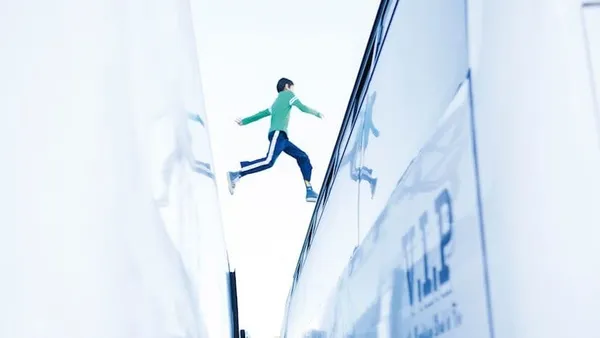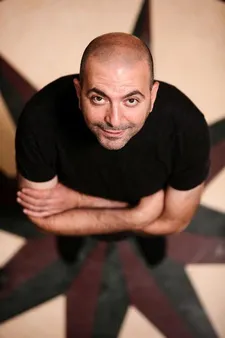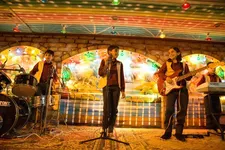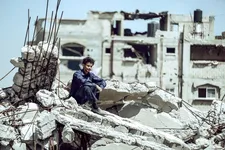 |
| Hany Abu-Assad: 'I want to make films that still mean something when the Occupation is something of the past' |
Hany Abu-Assad, 54, was born in Nazareth and came to the Netherlands when he was 20. He studied airplane technology and worked in this field until he discovered his passion for filmmaking. After doing production work for television, he directed his first feature The Fourteenth Chick in 1998, from a script by Dutch writer Arnon Grunberg. About 10 years ago, he moved to America, in search of a new adventure.
 |
| Hany Abu-Assad: 'I am a Dutch Arab. A bit part of my cultural identity has been formed in the Netherlands' |
"No, I'm not going to be an American. I still see myself as a Palestinian Dutchman, although I'm living in Nazareth again. I am a Dutch Arab. A big part of my cultural identity has been formed in the Netherlands."
Regarding this, he not only mentions Dutch filmmakers such as renowned director Paul Verhoeven and documentary makers Johan van der Keuken and Jos de Putter, as well as writers and poets, but to my surprise also the rather unorthodox and playful comedian and artist Wim T Schippers. Abu-Assad remembers that this sometimes controversial enfant terrible really was an eye-opener for him.
HA: Yes, this typical Dutch influence has been very important for me. Together, of course, with artists from Egypt and Syria, who influenced the Arab part of me.
LB: So can we see a bit of Wim T Schippers in The Idol?
HA: Yes, for example, that you can find something comical in tragic situations. Like when Mohammed's little sister gets seriously ill, even in the hospital she is still making jokes.
LB:And maybe those parkour artists that are suddenly emerging from the ruins of Gaza?
HA: Yes, that too.
LB:It surprises me there is very little politics in The Idol. The story touches me first emotionally. It's a movie that's at the same time joyful and tragic. Sometimes it seems Palestinian filmmakers have only one subject. But this is different. Was it a relief?
HA: I've been growing towards it. In the beginning the main subject of my films was the Occupation, but believe me, the Occupation will eventually die, and I want to make films that still mean something when the Occupation is something of the past.
The human story is something that stays. I want to make films that rise above the politics. To make art that is part of life itself, that's at least something I want to try. With politics as the decor in the background, but not occupying front stage.
LB:Did you really shoot The Idol in Gaza itself?
HA: With great difficulty we got permission from the Israeli authorities to film there for two days. After that, we had to move to the West Bank. Those parkour artists are original Gaza, just as many street scenes and the man without legs.
 |
| The Idol: ' I find it moving that music can bring solace, for in general life is full of disappointments' |
HA: The damage. After 2005, there were two destructive wars. In 2005, the city was not yet under siege, it was bustling with life, you could easily go in and out. The difference between the city then and now helped me to imagine Mohammed's journey from an innocent boy to a guilty adult.
LB:What was it that you wanted to show us in the first place?
HA: That a voice like Mohammed's can overcome the Occupation, can rise above the obstacles, that art can unite people, can provide inspiration and solace. I find it moving that music can bring solace, for in general life is full of disappointments.
LB:Does Mohammed, while growing older, express more and more the feelings of the Palestinian people?
HA: Definitely. He becomes the Palestinian voice, even if he doesn't want to and resists it. But in the end, he is forced to make that choice. Actually it's rather sad, he's a boy who just used to sing at weddings. No hero at all. Singing is what makes him happy, being a hero is not important.
LB: Mohammed lets a Palestinian voice being heard. Do you want to achieve something similar with your films?
HA: I don't feel it as a choice, but more as an obligation. I have a Netherlands passport, I could easily ignore all this and walk away from it. But then I would be a coward. So I'd rather let my voice be heard as a Palestinian. I want to fight with beauty, with art. So, yes, there are some similarities. But the difference is that Mohammed Assaf is very popular, while my movies are still art for the elite.
LB: Was Assaf involved in the making of The Idol? Could he have played himself?
HA: I asked him, but he didn't dare. 'I'm just a singer, what do you want from me?' But he has seen the movie and upon his request I have changed a few scenes. Out of respect.
LB: At least half of the story is about Assaf's childhood. The children playing this part are great.
HA: Those children were a big surprise for me. They are from Gaza, they experienced two wars, they lived with fear and therefore they have lost their fear. Now they are not afraid anymore to be vulnarable, to try things in front of the camera. Those 11-year-old boys and girls have grown up incredibly fast. They are traumatised in a positive way. Of course it is not quite right to lose your fear, but on the other hand they are enjoying life very much, they like to play a lot. Maybe unconsiously they feel: we can be dead any moment, so let's enjoy as much as we can.
LB: The Idol is a Palestinian/Dutch coproduction. Does there exist something as a Palestinian film industry?
 |
| Abu-Assad: 'I want to make films that rise above the politics. To make art that is part of life itself' |
You wouldn't try to establish a car industry under these circumstances. For that you need a state. But to make movies all you need is people with the right experience, it is knowledge that is not bound to a place.
LB: Somewhere I read that you intend to make a film about William of Orange, the founder of the state of the Netherlands. Is that really going to happen?
HA, laughing: Yes, indeed. The plans are in an advanced stage. Hazazah Pictures will be the producer. We are now reworking the treatment, after that we can start with the screenplay. This film will be my goodbye present. The Netherlands has been very good for me and I'd like to do something in return.
The Idol will be out on limited UK release on August 12.





















